July and August Highlights from the Medicine and Life Sciences Research Communities
Published in Bioengineering & Biotechnology, Microbiology, and Genetics & Genomics

Researchers and contributors on the Research Communities continue to share new insights into matters spanning multiple disciplines and topics. In this round-up post, we spotlight breastfeeding support, neonatal health, and the lived experience of donor human milk use. We also highlight the posts which focus on the growing recognition of loneliness and social connection as urgent public health concerns, presented breakthroughs shaping the global fight against hepatitis, and more.
Together, these pieces remind us that research is not only about data and discovery, but also about people, their stories, struggles, and solutions.
World Population Day
World Population Day, first observed on 11 July 1990 in over 90 countries, was established by the UN in response to the “Day of Five Billion” in 1987. Created to raise awareness of population issues and their links to development and the environment, it is now marked annually through activities led by UNFPA, governments, and civil societies worldwide.
This World Population Day, our attention was turned to a powerful but often overlooked driver of health: social connection.
Making the Case for Social Connection as a Core Dimension of Population Health
@Alice Coe and @Shereen Hussein explore a new WHO report, From Loneliness to Social Connection – Charting a Path to Healthier Societies, revealing the staggering impact of loneliness worldwide, affecting one in six people and contributing to more than 870,000 deaths each year. Disconnection harms health as much as smoking or obesity, yet remains under-researched and poorly addressed, especially in low- and middle-income countries with adolescents, older adults, migrants, and marginalized groups among the most at risk. Researchers are being called to develop better tools, capture diverse cultural experiences of connection, and evaluate interventions that can strengthen community ties and improve population health.
Explore how social connection is reshaping our understanding of public health, and why rebuilding human bonds may be one of the most pressing health challenges of our time.
From Low to Rising - How Loneliness Trends Shape Women’s Health Over Time
Loneliness isn’t just an uncomfortable feeling, it can quietly chip away at both physical and mental health. In this Behind the Paper post, @Neta HaGani and @Melody Ding followed more than 13,000 Australian women over 18 years to see how loneliness changes through midlife and older age, and what impact it has on health-related quality of life. They found that women experiencing rising or high levels of loneliness had the greatest declines in health and wellbeing, underscoring that loneliness should be treated as a serious public health risk comparable to smoking or physical inactivity.
Read the full post to learn how persistent loneliness is linked to poorer physical and mental health outcomes and why there is a strong importance of early screening, preventive support, and broader public health recognition of loneliness as a global issue.
World Hepatitis Day
World Hepatitis Day, marked on 28 July, calls for stronger global action against hepatitis, as highlighted in WHO’s 2017 report. The date honours Dr Baruch Blumberg, Nobel laureate who discovered hepatitis B and developed its test and vaccine. With low testing and treatment coverage still a major challenge, urgent efforts are needed to meet elimination goals by 2030.
Breaking Barriers, Dismantling Stigma
This post reminds us that hepatitis remains one of the world’s most pressing but overlooked health challenges, claiming over 1.3 million lives every year. Despite vaccines, effective treatments, and even a cure for hepatitis C, millions still go undiagnosed or untreated, especially in lower-income regions. World Hepatitis Day’s slogan this year is “lets break it down” which calls for urgent action to dismantle the financial, social and systemic barriers of hepatitis elimination.
@Giovanna Del Vecchio writes about the new research and highlights both the urgent gaps in prevention, testing, and care, and the promising advances, from machine learning–assisted diagnostics to innovative therapies and community-driven solutions.
Discover this From the Editors post and read the latest insights, challenges, and breakthroughs shaping the global fight against hepatitis.
Hepatitis B Discrimination: Global Responses Requiring Global Data
Hepatitis B affects over 250 million people worldwide, yet beyond the medical risks, many also face discrimination in workplaces, schools, healthcare, and even personal relationships.
In this Behind the Paper post, @Catherine Alise Freeland explores their ground breaking new study, the largest of its kind, which captures the lived experiences of people around the globe, revealing how stigma and misinformation undermine health, opportunity, and dignity.
Read more to explore how the findings highlight an urgent need for stronger policies, education, and protections. Uncover the stories, insights, and advocacy initiatives shaping the fight against hepatitis B–related discrimination.
World Breastfeeding Week
World Breastfeeding Week, held every August, highlights breastfeeding as a foundation for lifelong health, development, and equity.
World Breastfeeding week is under the banner of the WHO’s Healthy Beginnings, Hopeful Futures campaign, where the focus is on the vital support mothers and babies need from healthcare systems through skilled counselling, enforcing the International Code of Marketing of Breast-Milk Substitutes, and creating supportive environments at home, work, and in care. Breastfeeding reduces healthcare costs, boosts development, and gives children and societies healthier futures.
Celebrating World Breastfeeding Week 2025: Insights from BMC Series Journals
@Noohi Nasim reminds us that breastfeeding is more than nourishment; it’s a foundation for healthier families and stronger communities. This year the World Breastfeeding Week’s theme, “Prioritise Breastfeeding: Creating Sustainable Support Systems”, highlights the urgent need to support mothers in the face of social, cultural, and even climate challenges.
Fresh research reveals innovative ways to help women breastfeed successfully, including milk donation in Iran, emotional support tools in China, pharmacist-led counselling in Serbia, and AI-powered chatbots for new mothers. These studies not only show the health benefits, but also the economic and social impacts of stronger breastfeeding support systems.
Explore the latest insights and see how collective action, from families to health systems to technology, can transform breastfeeding outcomes worldwide.
The Voices of Long-Term Users of Pasteurised Donor Human Milk
When a mother’s own milk isn’t enough, donor human milk (DHM) can be a lifeline, but what is it like to use it long-term? A recent Behind the Paper post from @Ying Jin, @Dakota Sykes & @Linda Murray tells the story of a study which explored the experiences of six mothers who relied on DHM. It is a fascinating read with deeply personal journeys of acceptance, relief, and support.
They found that many mothers initially felt inadequate or ‘less of a parent’ when they couldn’t produce enough milk, but over time, DHM helped them reconcile expectations with reality. Beyond nutrition, it eased stress, allowed partners to participate in feeding, and provided reassurance.
Read the full post and learn about the emotional and practical importance of human milk banks, along with the need for accessible, compassionate, and equitable support systems that empower mothers while safeguarding infant health.
Don’t forget to like and start conversations in the comment section of the posts you enjoy. Is there more you would like to learn from the author? Let them know in the comments!
Further reading:
Follow the Topic
-
BMC Global and Public Health

An open access, transparent peer review journal publishing outstanding and influential research and opinion of broad interest to all professional communities involved in global and public health research, policy-making, implementation and delivery worldwide.
-
Nature Communications

An open access, multidisciplinary journal dedicated to publishing high-quality research in all areas of the biological, health, physical, chemical and Earth sciences.
-
BMC Public Health

An open access, peer-reviewed journal that considers articles on the epidemiology of disease and the understanding of all aspects of public health.
-
BMC Pregnancy and Childbirth

This is an open access, peer-reviewed journal that considers articles on all aspects of pregnancy and childbirth. It welcomes submissions on the biomedical aspects of pregnancy, breastfeeding, labor, maternal health, maternity care, trends and sociological aspects of pregnancy and childbirth.
Related Collections
With Collections, you can get published faster and increase your visibility.
Management of miscarriages in legally restrictive settings
BMC Pregnancy and Childbirth is calling for submissions to our Collection on the Management of miscarriages in legally restrictive settings.
Miscarriages are a common yet often traumatic experience for many individuals and couples, particularly in regions where induced abortion is subject to restrictive laws. The clinical management of miscarriage and induced abortion are very similar, with frequent diagnostic overlap, leading legal restrictions on abortion to affect care for pregnancy loss. In such contexts, the management of miscarriages can become complex, requiring healthcare professionals to navigate legal and ethical challenges while providing compassionate care and avoiding potentially life-threatening situations. The approach to spontaneous miscarriage in these restrictive settings may be influenced by various non-clinical factors, including access to medical resources, societal stigma, and legal considerations surrounding reproductive health. Addressing the management of miscarriages in legally restrictive settings is a significant and timely issue, as it directly affects the physical and emotional well-being of individuals facing these increasingly common situations.
The Collection invites researchers and clinicians in fields including maternal-fetal medicine, obstetrics, emergency medicine, public health, and the social sciences to contribute research that explores topics including, but not limited to, ethical considerations in miscarriage management, patient-centered approaches to miscarriage care, legal implications for obstetric management of miscarriage, and healthcare access in abortion-restrictive environments across the globe.
All manuscripts submitted to this journal, including those submitted to collections and special issues, are assessed in line with our editorial policies and the journal’s peer review process. Reviewers and editors are required to declare competing interests and can be excluded from the peer review process if a competing interest exists.
Publishing Model: Open Access
Deadline: May 02, 2026
Ensuring continuity of care in LMICs
BMC Global and Public Health is calling for submissions to our Collection on ensuring continuity of care in low- and middle-income countries (LMICs). In the realm of global health, one of the persistent challenges facing LMICs is ensuring the delivery of integrated, coordinated, and continuous care across healthcare services. The concept of seamless care is paramount, aiming to guarantee that individuals receive integrated and coordinated healthcare across different levels of the healthcare system and over time. This Collection seeks to shed light on innovative strategies, research findings, and practical solutions in LMICs.
We invite contributions that explore various dimensions of integrated, coordinated and continuous care of care in LMICs, including but not limited to:
Health System Strengthening: Investigations into approaches for strengthening health systems in LMICs to support seamless access to healthcare services. This may include efforts to improve infrastructure, enhance workforce capacity, and optimize service delivery models.
Integrated Care Models: Exploration of integrated care approaches that facilitate collaboration among diverse healthcare providers, services, and institutions. These models aim to improve care coordination, referrals, and counter-referrals, reduce fragmentation, and enhance the patient experience.
Digital Health Solutions: Assessments of the role of digital health technologies in enhancing continuity of care in LMICs. This may include the use of electronic health records, telemedicine, mobile health applications, AI, and other innovative digital tools to overcome barriers to access and improve healthcare delivery.
Community-Based Care: Studies on community-based healthcare initiatives that empower communities to take ownership of their health and well-being. These initiatives often play a crucial role in ensuring ongoing access to essential healthcare services, particularly in remote or underserved areas.
Policy and Governance: Examination of policy and governance frameworks aimed at promoting continuity of care in LMICs. This may include analyses of healthcare financing mechanisms, regulatory frame.
This Collection supports and amplifies research related to SDG 3: Good Health and Well-being by advancing our understanding of continuity of care and contributing to efforts to ensure equitable access to quality healthcare services for all populations, regardless of geographical location or socioeconomic status.
All manuscripts submitted to this journal, including those submitted to collections and special issues, are assessed in line with our editorial policies and the journal’s peer-review process. Reviewers and editors are required to declare competing interests and can be excluded from the peer review process if a competing interest exists.
Publishing Model: Open Access
Deadline: Apr 23, 2026
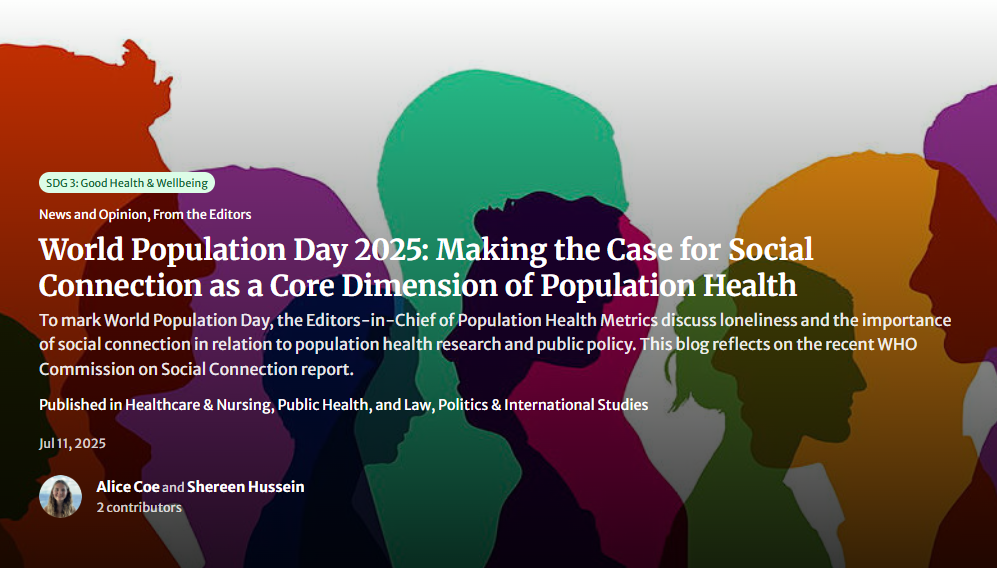
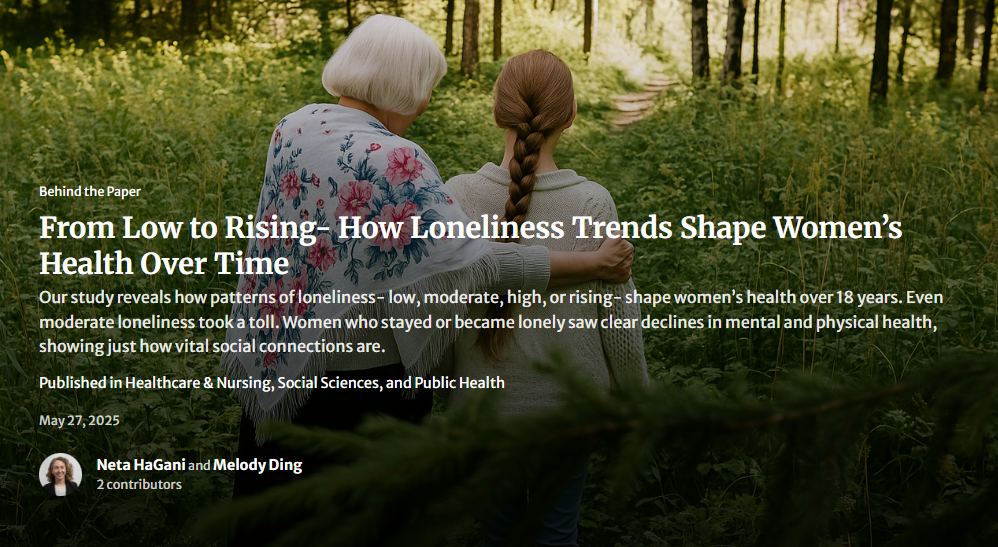
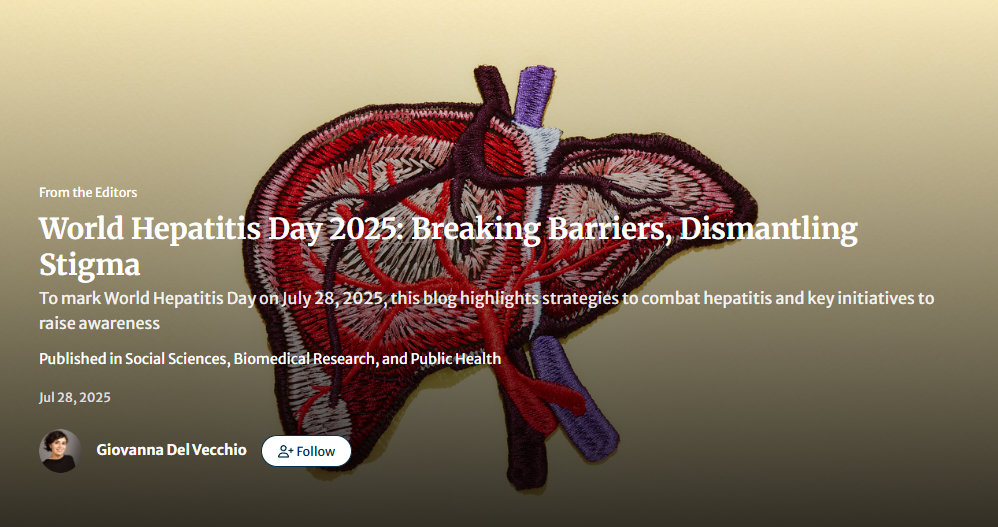
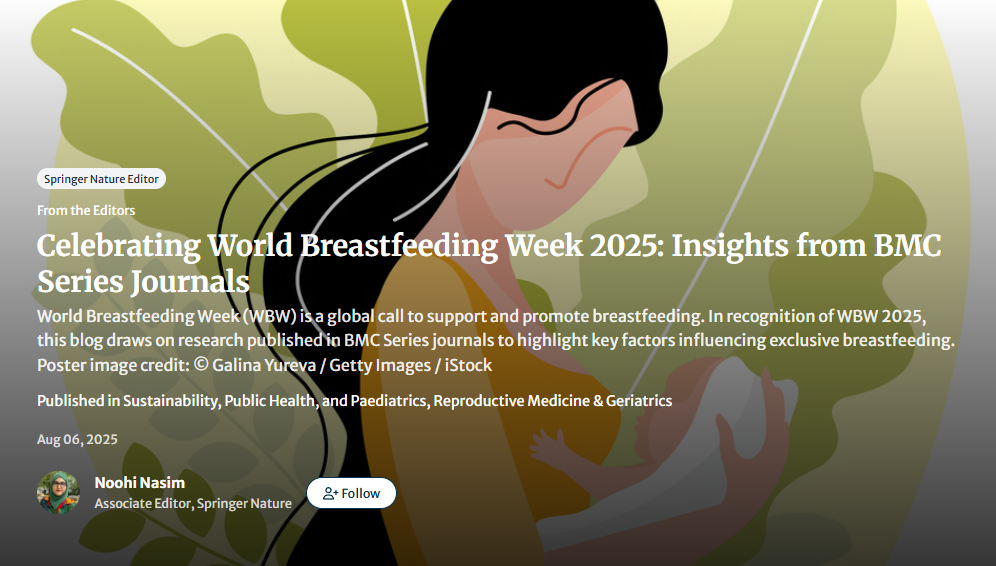
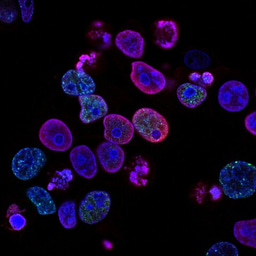




Please sign in or register for FREE
If you are a registered user on Research Communities by Springer Nature, please sign in
Thanks for featuring the Population Health Metrics social connection blog, Alice! Interesting to learn about the other blogs, too. Thank you for sharing.